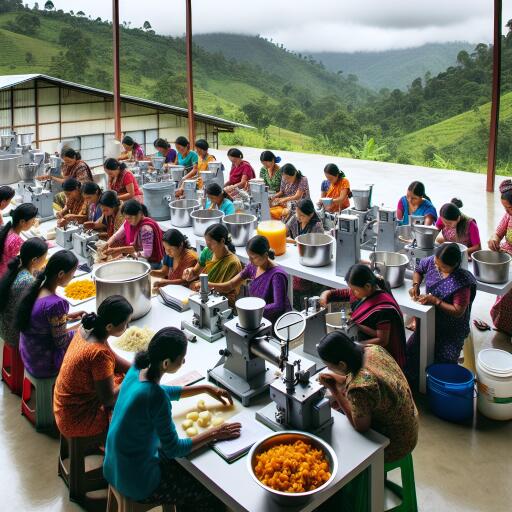
Empowering Women Through Food Processing Training in Karbi Anglong
In a noteworthy initiative to bolster rural women’s economic empowerment, a pioneering food processing training session was recently conducted in the serene landscapes of Karbi Anglong. This one-day workshop, hosted at the Community Resource Centre of Chandrasing Rongpi village, marked a collaborative effort aimed at fostering sustainable livelihoods through skill development in food processing techniques.
The workshop, involving 20 enthusiastic local women from the Kohora River Basin and Diring River Basin, provided profound insights into various facets of food processing. This initiative represented not just a skill enhancement exercise but a significant step towards economic empowerment and sustainability in rural economies. The training aimed to turn the abundant local produce into commercially viable products, presenting alternative livelihood opportunities for the community.
A comprehensive curriculum covered essential topics, including local produce identification, basic food safety, hygiene, preservation techniques, value addition, packaging, and labeling. Special emphasis was placed on leveraging traditional knowledge and resources, which ensured the training’s relevance and practical applicability to the participants’ daily lives.
Under the guidance of local experts, Mina Tokbipi and Larbin Timungpi, alongside dedicated facilitators from Aaranyak, the participants were introduced to the practical aspects of creating value-added food items such as pickles, jams, and chilli sauces. The training’s hands-on approach was instrumental in demystifying the food processing science, laying a solid groundwork for future endeavors.
Feedback from the participants was overwhelmingly positive, highlighting the clarity and preciseness of the training. Protima Rongpipi, from Phumen Engti village, commended the workshop for its practicality and expressed confidence in applying the learnt techniques to improve food preservation and reduce waste. Merina Kramsapi, another participant from Sarbura Singnar village, shared her appreciation for the initiative, emphasizing its potential to uplift local economies and contribute to household prosperity.
The training session underscored the importance of not just skill development but also building business acumen among rural women. By equipping participants with the necessary skills to market and sell their products, the initiative aimed at fostering financial independence and contributing to the broader goal of poverty alleviation and economic sustainability in the region.
The successful conduct of this workshop was a result of the tireless efforts of the entire organizing team, demonstrating the power of collective action in driving positive community change. It represented a significant milestone in the journey towards empowering women in rural areas, providing them with valuable tools to transform their lives and communities.
Organizations like Aaranyak play a crucial role in biodiversity conservation and sustainable development, especially in ecologically sensitive areas like Kaziranga-Karbi Anglong and Manas landscapes. Through such initiatives, supported by IUCN-KfW and USFWS, they not only aim to preserve the environment but also to enhance the livelihoods of indigenous communities by promoting sustainable practices and education.
As the world moves towards greener economies, such training programs highlight the importance of integrating traditional knowledge with modern techniques to achieve sustainability. Empowering women with such skills not only contributes to economic development but also to the creation of a more equitable society.





Leave a Reply